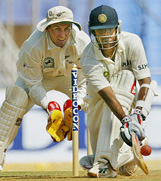COACHING
The Ten Commandments of Wicketkeeping - Part I
Just as all roles in life are governed by certain norms and ethics, so do the duties of every member of a cricket team. There is a set of 'commandments' that each player is expected to follow. The wicketkeeper is no exception.The Ten Commandments of Keeping:
1) Concentrate, concentrate and concentrate.
2) Anticipate confidently.
3) Make sure your equipment is right.
4) Watch the ball.
5) Balance.
6) Do not snatch at the ball.
7) Whenever possible, try to bring the body behind the ball.
8) Wear gloves that are big.
9) Point the fingers outwards and downwards.
10) Work hard to maintain a reasonable level of fitness and
to ensure that your reflexes and eyes remain sharp.
Let's focus on the first and most important 'commandment'.
Concentration is just as vital for a wicketkeeper as it is for a batsman. One mistake and you might well lose a match for your team. Therefore, it is vital that a keeper guards against lapses in concentration. He should be able to concentrate intensely, and for long periods.

New Zealand keeper
Brendon McCullum watches
Dravid play the sweep
Like the batsman, the keeper should start
concentrating on the bowler's hand as soon as the
latter begins his run-up. The intensity should
increase with every step, so that by the time the
bowler delivers the ball, his concentration is at
its peak.
This helps the keeper to judge the length of the ball, which way it is going, whether it will swerve or swing, etc. Consequently, the keeper is able to balance himself better. Keepers have to judge the speed, direction, height, etc in a split-second. Imagine you are keeping to a Shoaib Akhtar or a Shane Bond, who are hurling rockets at around 100mph. A situation as challenging as this calls for planning and anticipation. You need to have the tenacity to implement your plans when the ball flies towards you at that speed. You simply cannot let your mind wander.
This helps the keeper to judge the length of the ball, which way it is going, whether it will swerve or swing, etc. Consequently, the keeper is able to balance himself better. Keepers have to judge the speed, direction, height, etc in a split-second. Imagine you are keeping to a Shoaib Akhtar or a Shane Bond, who are hurling rockets at around 100mph. A situation as challenging as this calls for planning and anticipation. You need to have the tenacity to implement your plans when the ball flies towards you at that speed. You simply cannot let your mind wander.
Lapses in concentration are more responsible for ruining a wicketkeeper's career more than any other reason. Several keepers have been found wanting because of their inability to concentrate for long periods with the required level of intensity. Any cricketer can catch the ball. It does not require a great skill. But the cricketer's concentration-levels should be adequate enough to anticipate and react quickly and correctly.
A strong mind that can help you overcome all the odds is the key to your success as a keeper. How else would you explain the success of Rahul Dravid behind the stumps in ODIs? He wasn't a regular keeper, and many people had advised him against it, for they felt the additional responsibility would have an adverse effect on his batting. But Rahul did not listen to them and did the job manfully and competently. The man is endowed with a vibrant, dynamic and positive cricketing brain.
Concentration helps the keeper to overcome internal disturbances and external hindrances. Each batsman has his own ritual before the ball is bowled or his unique brand of technique. Take a case of Brian Lara. His backlift is such that the keeper's vision is bound to be obscured. Sanath Jayasuriya's ritual of touching the wickets an umpteen number of times before facing the ball could also be a distraction.
The worst thing any keeper can do is continue to think about an error he may have committed. Moping about a mistake will only disturb his focus, and before he realises it, he will have made another mistake!
The ability to anticipate is developed and honed over a period of time. Everyone makes mistakes. But the frequency of mistakes decreases as one gains experience and confidence. Anticipation and concentration is not confined to the line, length and direction of the ball. It applies to the batsman's strokes as well. A keeper can prepare himself better and quicker for a possible chance if he is able to anticipate the shot the batsman is going to execute.
If a wicketkeeper's job is to be described in a succinct manner, the word 'demanding' fits the bill perfectly. But then, no individual can be forced to keep wickets unless the circumstances are extreme. It is a job a player gets into willingly, and therefore he has to do justice to it. It is difficult and quite exhausting to concentrate for six hours. But the keeper has to psyche himself, talk to himself, and do everything he can to keep himself alert.
To be continued.
The Ten Commandments of Wicketkeeping - Part II